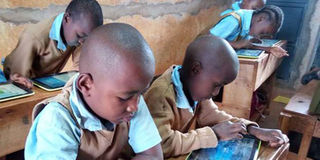Next ten years promise development through ICT-propelled transformation for Africa

Class One students at Mwangea Primary School in Voi, Taita Taveta use tablets supplied by the government during a lesson on July 7, 2016. PHOTO | LUCY MKANYIKA | NATION MEDIA GROUP
What you need to know:
It is envisaged that through Smart Africa, a single digital and knowledge-driven economy will emerge and push the continent’s global competitiveness to higher levels.
However, for this to happen, African countries must take deliberate measures to create enabling platforms for large-scale implementation of ICT in all areas of the society and economy.
The next decade promises development through an ICT-propelled transformation for Africa. The launch of the Smart Africa Initiative in Kigali, Rwanda, in October 2013, set a renewed pace for the realisation of the continent’s development aspirations.
It is envisaged that through Smart Africa, a single digital and knowledge-driven economy will emerge and push the continent’s global competitiveness to higher levels. However, for this to happen, African countries must take deliberate measures to create enabling platforms for large-scale implementation of ICT in all areas of the society and economy.
In Kenya, the Digital Literacy Programme is one of the steps that the government has taken. Through this programme, the government is fulfilling the promise of developing innovative skills for a globally competitive knowledge economy, promoting research and development and locally assembled/manufactured goods and services, and enhancing job creation.
Its immediate aim is to integrate ICT into teaching and learning for Class One pupils in order to create a critical mass of future ICT-grounded citizens capable of turning around Kenya’s development fortunes. Several hundred schools have received digital tablets and beginning October 30, 2016, Cabinet and principal secretaries will be out in the field overseeing and inspecting the distribution of digital tablets, laptops, projectors, and communications hubs to public primary schools countrywide.
ENTIRE COUNTRY
Three thousand schools will be equipped by the end of October and by December this year, the entire country will have been covered, thereby setting Kenya on course to a tech-savvy future generation.
Although the programme was initiated with the main purpose of enhancing learning in public primary schools through the use of digital technologies, it has transferred secondary benefits, ranging from lighting up far-flung areas that had no electricity to triggering subsidiary economies.
Citizens in remote areas can now get electricity by virtue of their proximity to the targeted primary schools. There is increased Internet access to citizens, access to online government services, global awareness and collaboration, and community participation in education matters through school websites, emails, and blogs.
Employment opportunities have been created in development of software, hardware, and content. The plans being put in place to ensure the maintenance and sustainability of the programme will result in the development of local assembly and manufacturing capabilities. In the next few years, Kenyans will be able to use digital products designed and made by Kenyans, for Kenyans.
WORKED TOGETHER
Several government agencies, under the coordination of the ICT Authority, have worked together. The Ministry of Education has provided leadership in the development of curriculum content for use on the digital platform, capacity building, and training for teachers and other relevant education stakeholders.
The Ministry of Industry, Trade and Cooperatives has been instrumental in developing and implementing plans to ensure local assembly of digital devices and related accessories. Construction is under way for the development of two local assembly plants at Moi University and Jomo Kenyatta University of Agriculture and Technology.
The Ministry of Energy and Petroleum has fast-tracked supply of electricity to targeted primary schools and to date, all public schools have been connected to the national grid.
In order to help accelerate the roll-out of the programme, young ICT graduates, most of whom are alumni or current participants in the Presidential Digital Talent Programme, have been deployed to every sub-county to carry out training, quality inspection, and other tasks.
Isn’t it amazing how what started out as a simple idea has now grown into a truly transformative programme, not just in education, but for the entire country?
Joe Mucheru is the Cabinet secretary for the Ministry of Information Communications and Technology.





